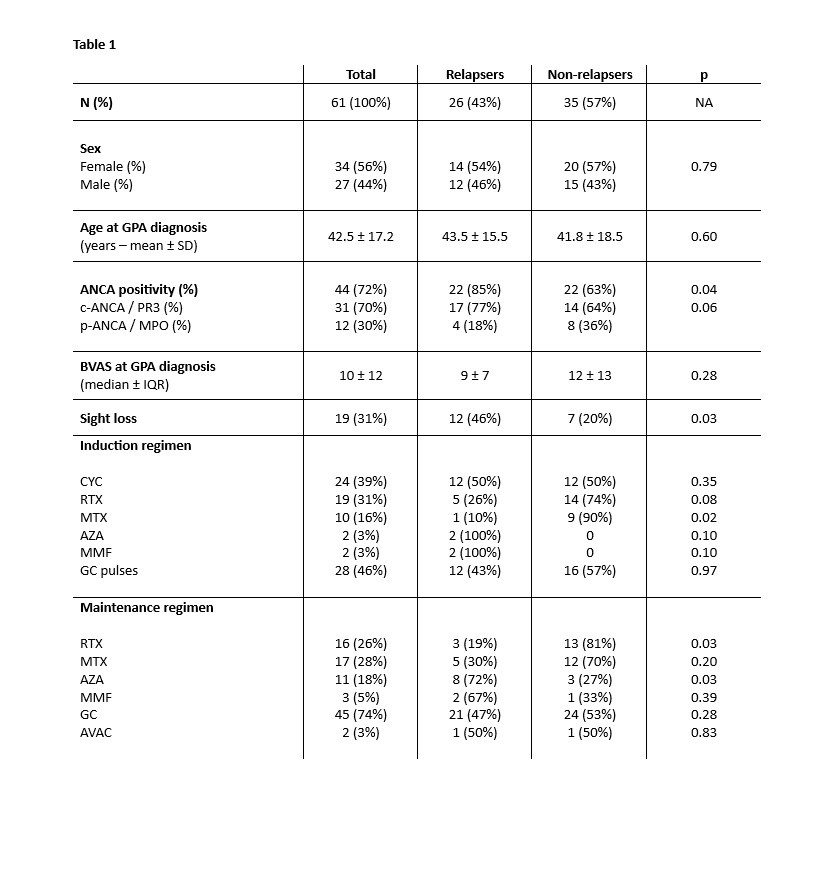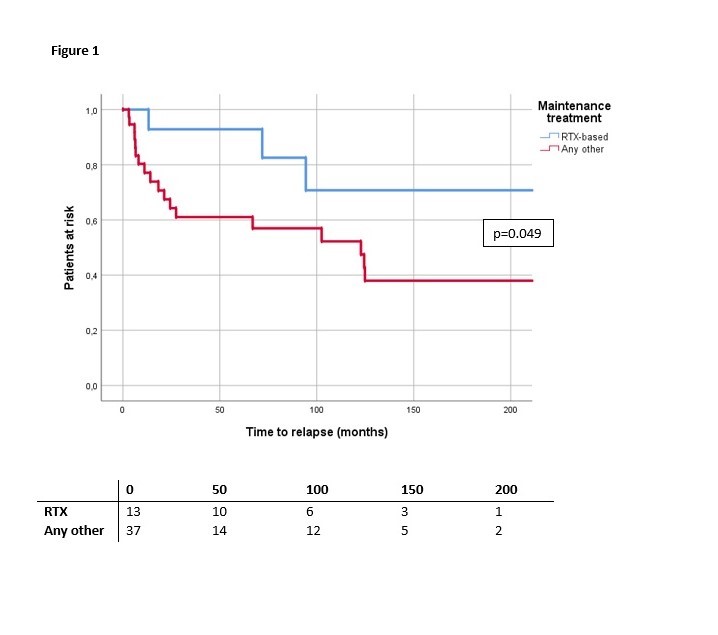Session Information
Session Type: Poster Session C
Session Time: 10:30AM-12:30PM
Background/Purpose: Orbital Pseudotumor (OPT) is a rare organ-threatening manifestation of Granulomatosis with Polyangiitis (GPA), with severe prognosis and historically refractory to most treatments. This is an interim report from the STOP-GPA study, a collaborative European study on difficult-to-treat manifestations of GPA.
Methods: This retrospective, multicentre study included OPT patients who fulfilled 2022 ACR/EULAR criteria for GPA, diagnosed between 1980 and 2023. OPT relapse was defined as worsening symptoms or dimensional increase of orbital inflammatory tissue at imaging. Chi-square, student’s t-test or Mann-Whitney tests were used to compare categorical and continuous variables respectively. We compared clinical variables and treatments between relapsing and non-relapsing patients. Time to relapse (TTR) was evaluated by survival analysis and Breslow test.
Results: The study included 61 patients (mean age at GPA diagnosis: 43 years, BVAS: 10), with positive ANCA in 44 (72%). ANCA positivity is associated with relapse (85% vs 63%, p=0.04) with a trend towards a stronger association with anti-PR3 (Table 1). Relapse is also associated with sight loss (46% in relapsers vs. 20% in non-relapsers, p=0.03).
Twenty-eight patients (46%) received glucocorticoid pulses as part of induction treatment with apparently no impact on relapsing behaviour of the disease over time. Metothrexate is the only agent significantly associated with a reduced relapse risk if used in the induction phase (10%, p=0.02), followed by rituximab (26%, p=0.08).
When used as a maintenance drug, RTX is associated with the lowest relapse risk (19%, p=0.03), while azathioprine is associated with the worst disease course (relapse rate 72%, p=0.03).
Moreover, during the maintenance phase with a median follow-up of 87 months (IQR 32-177 months), RTX significantly prolongs the time to relapse as displayed in Figure 1.
Conclusion: This preliminary analysis of the STOP-GPA study demonstrates that relapses in OPT are strongly associated with sight loss. ANCA positivity, and particularly anti-PR3 antibodies may detect patients at risk for relapse. In absence of higher level evidence, and waiting for more detailed and complete results, we suggest that combination treatment with RTX and MTX can be considered for induction and maintenance in patients with GPA-related OPT in order to avoid irreversible organ damage.
To cite this abstract in AMA style:
Moroni L, Gallina G, Lanzillotta M, Maggioni S, Benanti G, Cariddi A, Delvino P, Monti S, Milanesi A, Fagni F, Fornaro M, Taille C, Treppo E, Pugnet G, Chiara E, Padoan R, Iorio L, Davanzo F, Fiorin E, Berti A, Bortolotti R, Moiseev S, Novikov P, Ates A, Omma A, Ogut T, Kart-Bayram G, Demirci T, Kardas R, Karadağ Ö, Matucci-Cerinic M, Dagna L. Orbital Pseudotumor in Granulomatosis with Polyangiitis. Interim Analysis of Clinical Outcomes from a European Collaborative Observational Study [abstract]. Arthritis Rheumatol. 2024; 76 (suppl 9). https://acrabstracts.org/abstract/orbital-pseudotumor-in-granulomatosis-with-polyangiitis-interim-analysis-of-clinical-outcomes-from-a-european-collaborative-observational-study/. Accessed .« Back to ACR Convergence 2024
ACR Meeting Abstracts - https://acrabstracts.org/abstract/orbital-pseudotumor-in-granulomatosis-with-polyangiitis-interim-analysis-of-clinical-outcomes-from-a-european-collaborative-observational-study/


